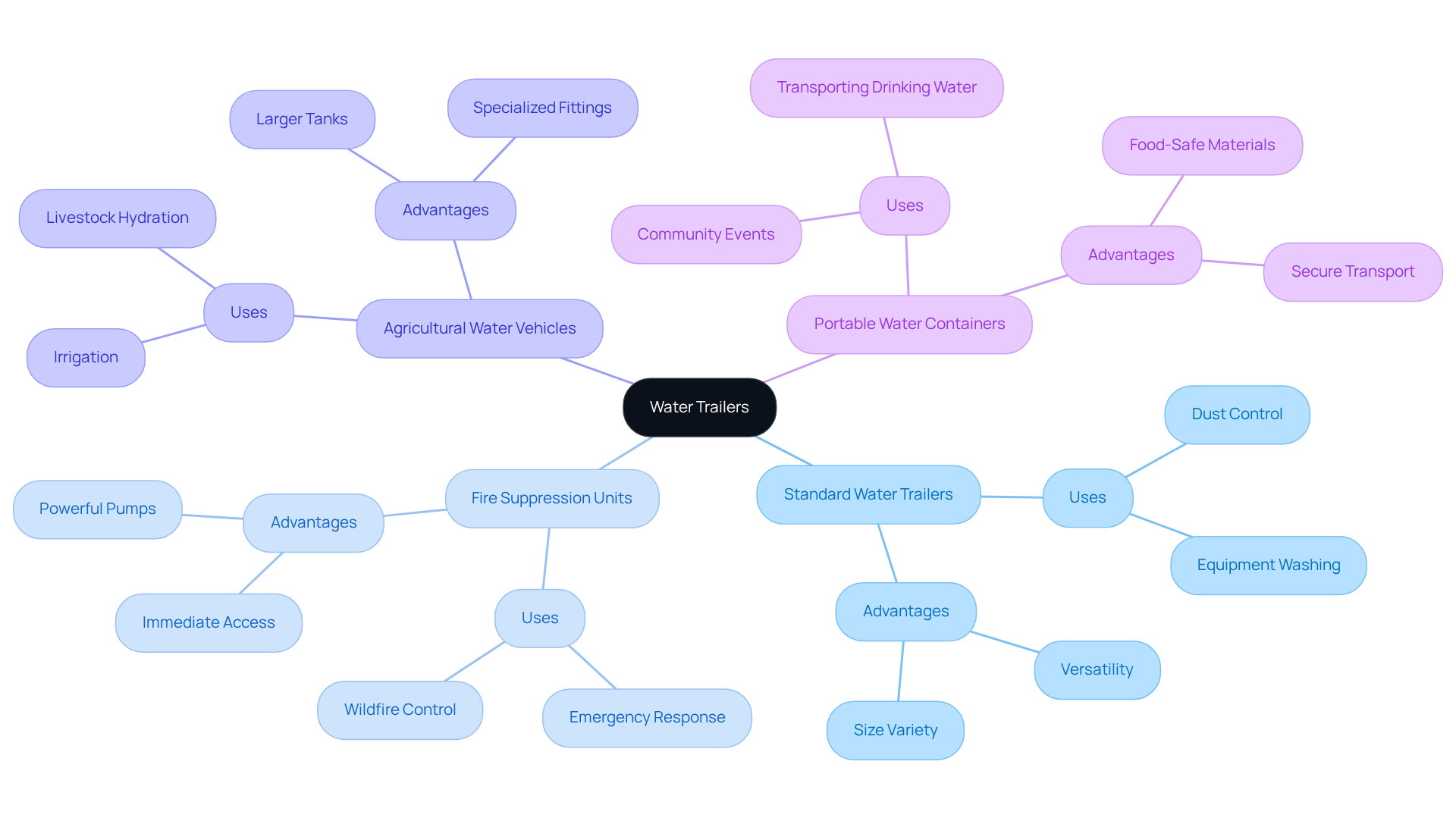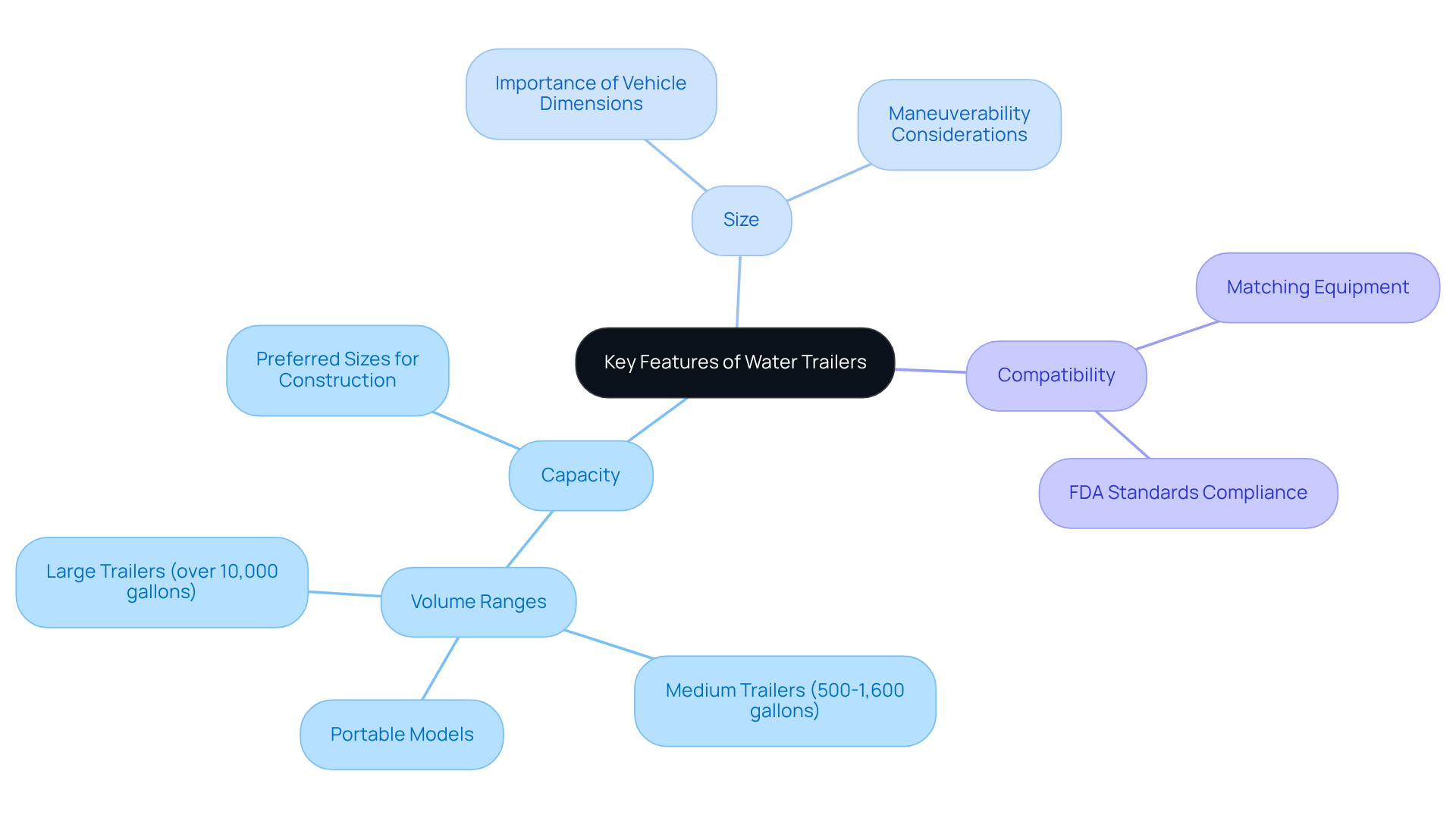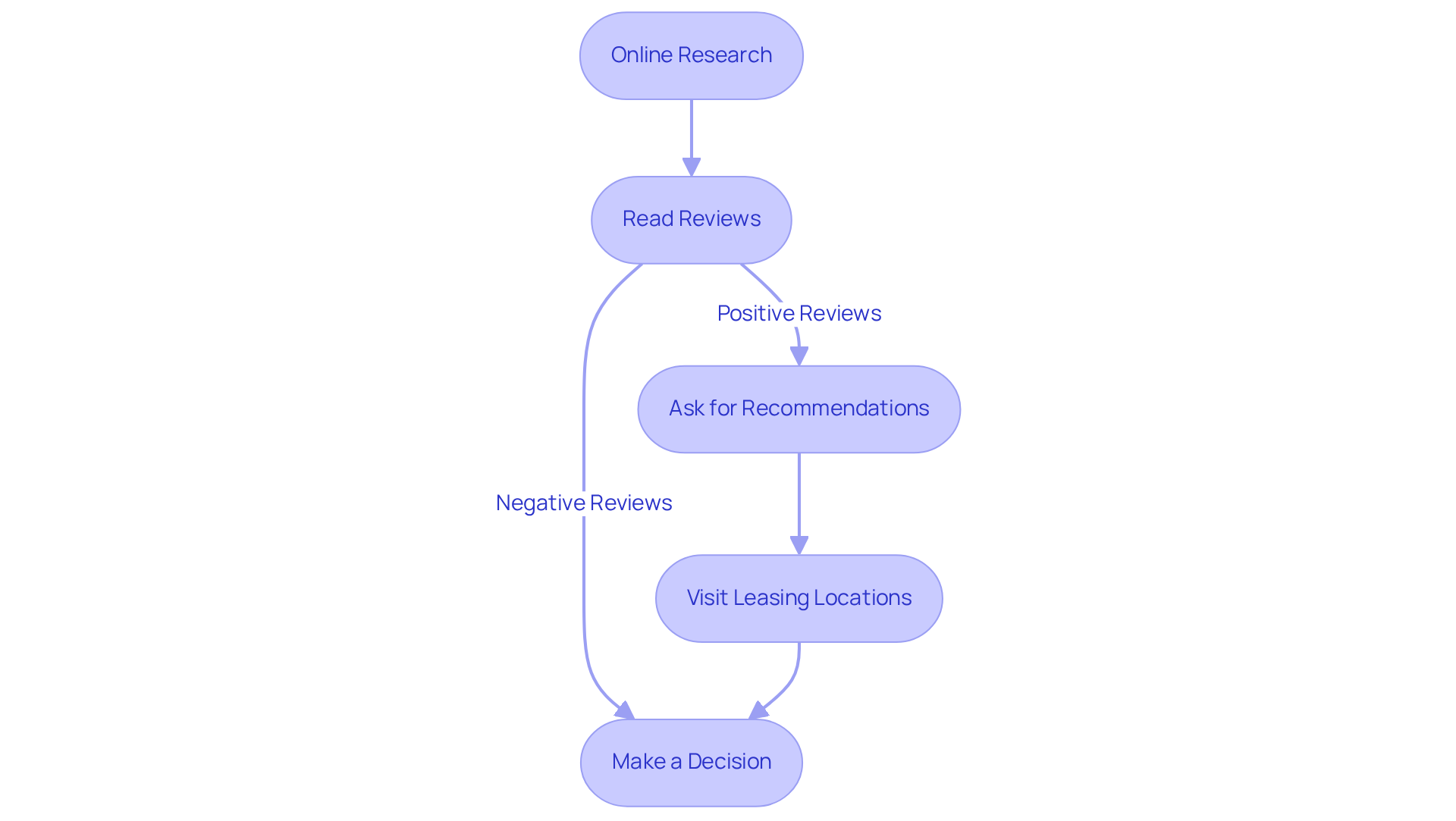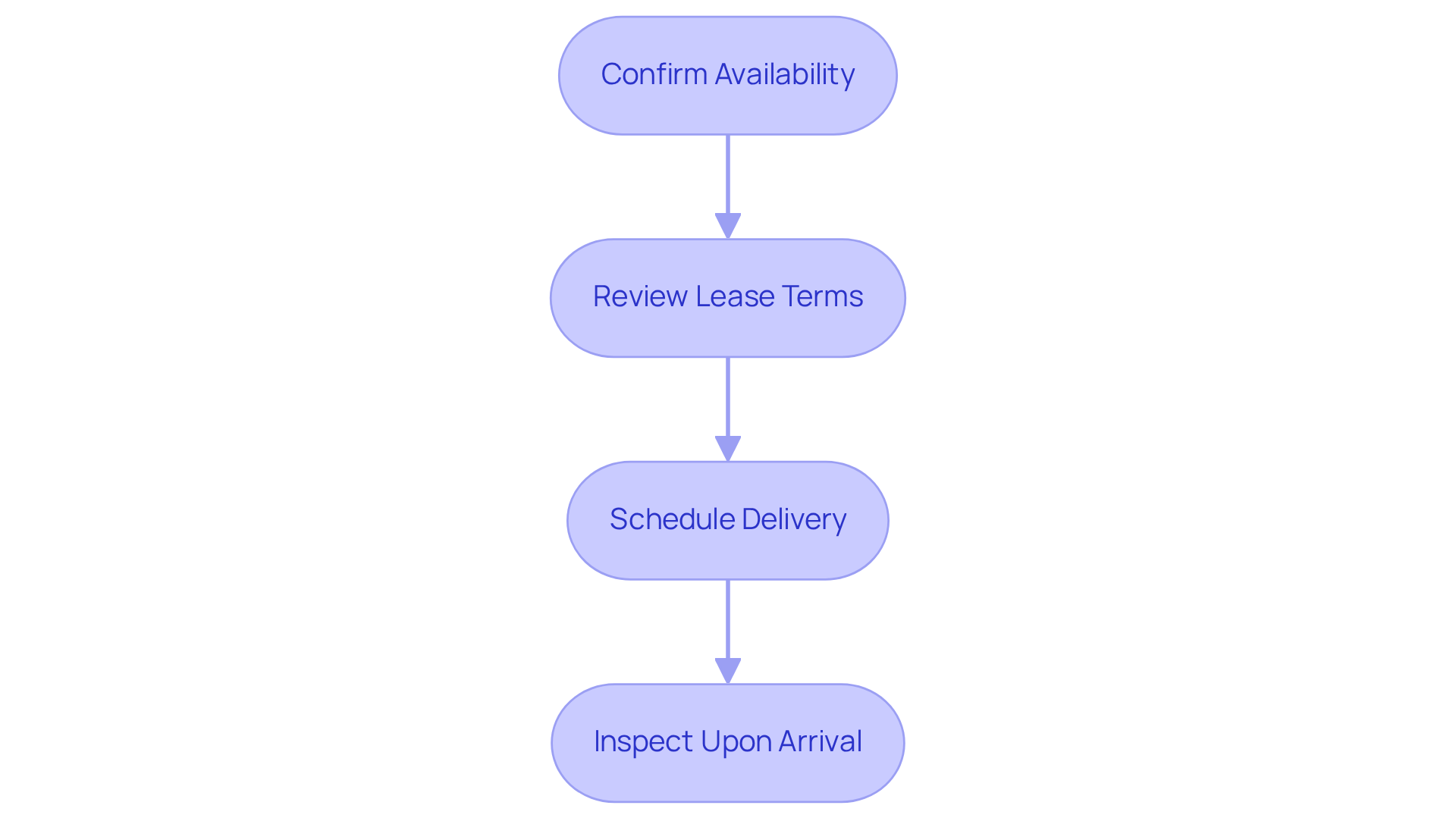Overview
To locate a water trailer for your project, begin by conducting thorough online research. Read reviews to identify reliable rental services that can meet your needs. Next, assess the key features of potential trailers to ensure they align with your project's requirements. Finally, finalize your rental by confirming availability and inspecting the trailer upon delivery.
This article supports your efforts by detailing the various types of water trailers available, their specific uses, and the crucial aspects of evaluating capacity, size, and compatibility. Additionally, it provides practical steps for securing a rental service, ensuring you make an informed decision.
Key Highlights:
- Water trailers are vital for transporting fluids in construction, landscaping, and agriculture.
- Types of water trailers include standard trailers for general use, fire suppression units, agricultural vehicles, and portable water containers for drinking water.
- Standard water trailers help control dust and maintain safety on construction sites.
- Fire suppression units are essential for emergency response in wildfire-prone areas.
- Agricultural water vehicles assist in irrigation, especially in areas with limited moisture.
- Portable water containers ensure access to clean drinking water in various settings.
- Water trailer capacities range from 100 gallons to over 10,000 gallons, with 500-1,600 gallons preferred for construction.
- Key features to consider when selecting a water trailer include capacity, size, and compatibility with existing equipment.
- To find reliable rental services, conduct online research, read reviews, ask for recommendations, and visit leasing locations.
- Finalise rental by confirming availability, reviewing lease terms, scheduling delivery, and inspecting the trailer upon arrival.
Introduction
Navigating the landscape of liquid transport can be a formidable task, particularly given the plethora of options available for water trailers. These indispensable vehicles are vital across diverse industries, from construction to agriculture, facilitating efficient fluid management. As project managers strive to enhance their operations, the challenge becomes identifying the water trailer that best meets their specific needs while also securing dependable rental services. To streamline this process and ensure the ideal water trailer for any project, several strategic steps can be taken.
Understand Water Trailers: Types and Uses
Liquid transport vehicles are essential tools for efficiently moving and supplying fluids across various applications, including construction, landscaping, and agriculture. Understanding the different types of liquid transport vehicles can significantly enhance project efficiency and effectiveness. Here are the primary categories:
-
Standard Water Trailers: These versatile trailers are widely used for general water transport and come in various sizes. They are particularly advantageous on construction sites for dust control and equipment washing, which helps maintain a safe and clean working environment. Their ability to control dust pollution not only enhances air quality but also improves worker safety.
-
Fire Suppression Units: Specifically designed for firefighting, these vehicles are equipped with powerful pumps and hoses. They are crucial for projects located in wildfire-prone areas, providing immediate access to resources for emergency response.
-
Agricultural Water Vehicles: Tailored for agricultural applications, these units typically feature larger tanks and specialized fittings for irrigation. They enable farmers to effectively irrigate crops and livestock, especially in regions with limited moisture access.
-
Portable Water Containers: Constructed from food-safe materials, these units securely transport drinking water. They are vital for ensuring access to clean resources in various settings, including remote construction sites and community events.
The market for liquid transport units is diverse, and water trailers near me play a pivotal role in construction and landscaping. The liquid transport market was valued at USD 150 million in 2024 and is projected to reach USD 250 million by 2033, reflecting the growing demand for efficient management solutions. As the need for these solutions continues to rise, understanding the specific uses and benefits of each type of tank will aid in selecting the most suitable option for your needs. Moreover, with proper maintenance, a high-quality liquid transport unit can last between 10 to 20 years, making it a worthwhile investment for any manager.

Evaluate Key Features: Capacity, Size, and Compatibility
When selecting a water trailer, it's essential to consider key features that will enhance your project's efficiency and effectiveness.
-
Capacity is a critical factor. Assess the volume of water required for your project; water containers are available in sizes ranging from 100 gallons for portable models to over 10,000 gallons for large-scale applications. For most construction needs, a water trailer near me with capacities between 500 and 1,600 gallons is favored, striking a balance between efficiency and refill frequency. Medium water trailers near me (500 - 1,000 gallons) are particularly preferred for construction sites due to their maneuverability and sufficient water volume.
-
Size also plays a vital role. Ensure the dimensions of the vehicle for towing align with your towing vehicle's capabilities and the specific site conditions. Larger vehicles may be advantageous for extensive projects, but they can present challenges in confined areas or on uneven ground.
-
Compatibility is another crucial aspect. Verify that the vehicle is compatible with your existing equipment, such as pumps and hoses. This compatibility is essential for seamless operation and can prevent unnecessary additional purchases. For example, a vehicle equipped with brass nozzles and a reliable pumping system guarantees consistent fluid flow, enhancing operational efficiency. Additionally, ensure that the vehicle complies with FDA standards for the secure storage of drinkable liquids, particularly if you intend to transport drinking water.
By thoroughly assessing these characteristics and analyzing financing options for your budget, you can select a liquid transport unit that effectively meets your project's needs. This ensures optimal performance and resource management, ultimately leading to a successful outcome.

Locate Reliable Rental Services: Research and Recommendations
To locate reliable rental services for water trailers, follow these essential steps:
-
Online Research: Begin by searching for equipment leasing companies in your area that specifically list water trailers near me in their inventory. This targeted approach effectively narrows down your options, ensuring you find the most relevant services available.
-
Read Reviews: Investigate customer reviews on platforms such as Google, Yelp, or specialized construction forums. Positive feedback often reflects a reputable service, while negative reviews can highlight potential issues that you may want to avoid.
-
Ask for Recommendations: Consult with colleagues or industry contacts for their recommendations. Personal experiences can provide invaluable insights into the reliability and quality of leasing services, helping you make a more informed decision.
-
Visit Leasing Locations: If possible, visit leasing locations to examine the equipment directly and interact with the staff. This interaction allows you to assess the quality of service and the condition of the equipment available, further ensuring you make the right choice.
By conducting thorough research and utilizing personal recommendations, you can confidently find a service, such as a water trailer near me, that aligns with your project needs and expectations.

Finalize Your Rental: Booking and Delivery Considerations
To finalize your water trailer rental, follow these essential steps:
-
Confirm Availability: Contact the service to ensure that the water trailer is accessible for your specified borrowing period. This step is crucial, as demand can fluctuate based on project timelines and seasonal needs. According to industry insights, the average leasing duration for construction equipment is generally around two weeks, making advance planning essential.
-
Review Lease Terms: Thoroughly examine the lease agreement, focusing on terms related to usage, insurance, and liability. Understanding these details will help you avoid unexpected costs and ensure compliance with the rental service's policies. As Josh Nickell, Vice President of the American Rental Association, emphasizes, effective planning and analytics are vital in equipment management to avoid guesswork.
-
Schedule Delivery: Arrange the delivery of the liquid transport unit to your work site, ensuring that the delivery date aligns with your timeline. Timely delivery is vital to prevent disruptions in your workflow, as delays can impact project timelines. It's important to inquire about average delivery times for a water trailer near me, as these can vary based on location and demand.
-
Inspect Upon Arrival: Upon delivery, examine the vehicle for any damage or operational issues before accepting it. Document any concerns with photographs or written notes to prevent disputes regarding the trailer's condition later on. This step is essential, particularly considering recent growth in leasing services, such as H&E Equipment Services' new branch in Texas, which emphasizes the significance of dependable service and prompt inspections.
By adhering to these steps, you can facilitate a smooth rental process that effectively meets your project requirements.

Conclusion
Finding the right water trailer for a project involves more than just locating a rental service; it requires a comprehensive understanding of the various types of trailers available and their specific applications. By grasping the nuances of standard water trailers, fire suppression units, agricultural vehicles, and portable containers, you can make informed decisions that enhance project efficiency and ensure safety on-site.
Key considerations such as capacity, size, and compatibility play a crucial role in selecting the most suitable water trailer. Assessing the volume of water required, ensuring the dimensions align with towing capabilities, and confirming compatibility with existing equipment are essential steps in the decision-making process. Furthermore, thorough research into rental services—including reading reviews and seeking recommendations—ensures that the chosen provider meets project needs effectively.
Ultimately, securing a water trailer rental is vital for successful project execution. By following the outlined steps:
- Confirming availability
- Reviewing lease terms
- Scheduling delivery
- Inspecting upon arrival
Project managers can avoid potential pitfalls and ensure a smooth rental experience. With the growing demand for liquid transport solutions, taking the time to understand and implement these strategies will not only streamline operations but also contribute to the overall success of any project requiring water transport.
Frequently Asked Questions
What are liquid transport vehicles used for?
Liquid transport vehicles are essential for efficiently moving and supplying fluids across various applications, including construction, landscaping, and agriculture.
What are standard water trailers, and what are their uses?
Standard water trailers are versatile trailers used for general water transport, particularly on construction sites for dust control and equipment washing, which helps maintain a safe and clean working environment.
What are fire suppression units?
Fire suppression units are specifically designed for firefighting, equipped with powerful pumps and hoses, providing immediate access to resources for emergency response in wildfire-prone areas.
How are agricultural water vehicles different from other types?
Agricultural water vehicles are tailored for agricultural applications, featuring larger tanks and specialized fittings for irrigation, enabling effective irrigation of crops and livestock, especially in areas with limited moisture access.
What are portable water containers, and where are they used?
Portable water containers are constructed from food-safe materials and are used to securely transport drinking water, vital for ensuring access to clean resources in settings like remote construction sites and community events.
What is the market outlook for liquid transport units?
The liquid transport market was valued at USD 150 million in 2024 and is projected to reach USD 250 million by 2033, indicating growing demand for efficient management solutions.
How long can a high-quality liquid transport unit last with proper maintenance?
With proper maintenance, a high-quality liquid transport unit can last between 10 to 20 years, making it a worthwhile investment for managers.




